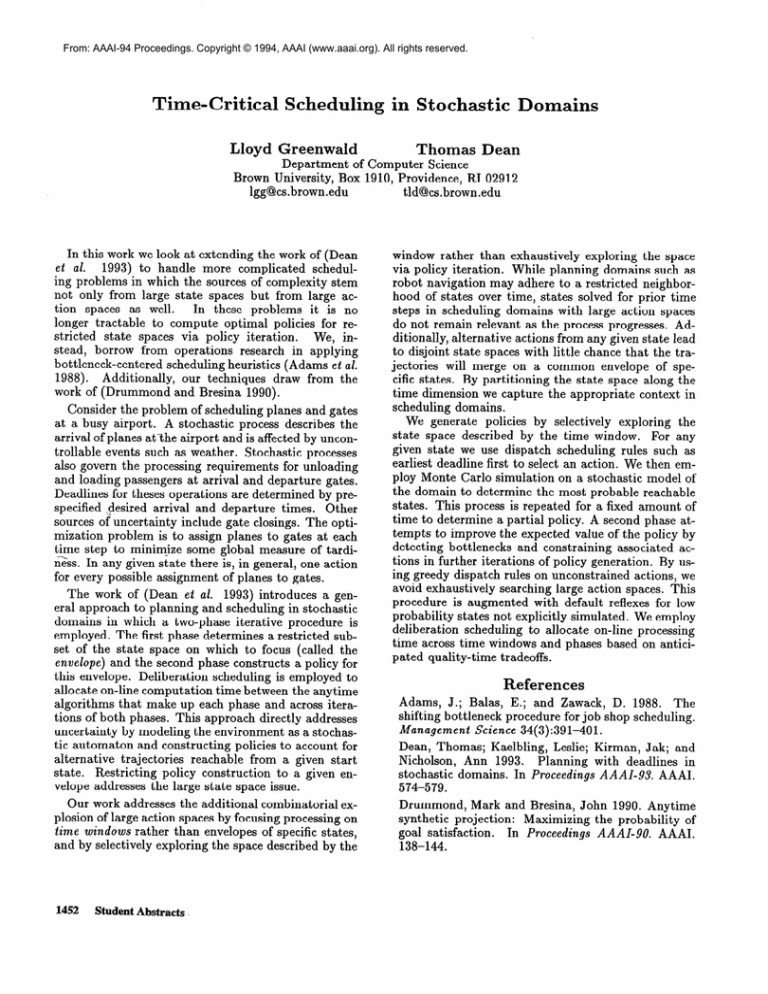
From: AAAI-94 Proceedings. Copyright © 1994, AAAI (www.aaai.org). All rights reserved.
Time-Critical
Scheduling in Stochastic Domains
Lloyd Greenwald
Thomas
Dean
Department of Computer Science
Brown University, Box 1910, Providence, RI 02912
lgg@cs.brown:edu
tld@cs.brown.edu
In this work we look at extending the work of (Dean
1993) to handle more complicated scheduling problems in which the sources of complexity stem
not only from large state spaces but from large action spaces as well.
In these problems it is no
longer tractable to compute optimal policies for restricted state spaces via policy iteration.
We, instead, borrow from operations research in applying
bottleneck-centered scheduling heuristics (Adams et al.
1988). Additionally, our techniques draw from the
work of (Drummond and Bresina 1990).
et al.
Consider the problem of scheduling planes and gates
at a busy airport. A stochastic process describes the
arrival of planes at-the airport and is affected by uncontrollable events such as weather. Stochastic processes
also govern the processing requirements for unloading
and loading passengers at arrival and departure gates.
Deadlines for theses operations are determined by prespecified desired arrival and departure times. Other
sources of uncertainty include gate closings. The optimization problem is to assign planes to gates at each
time step to minimize some global measure of tardi6%~. In any given state there is, in general, one action
for every possible assignment of planes to gates.
The work of (Dean et al. 1993) introduces a general approach to planning and scheduling in stochastic
domains in which a two-phase iterative procedure is
employed. The first phase determines a restricted subset of the state space on which to focus (called the
envelope) and the second phase constructs a policy for
this envelope. Deliberation scheduling is employed to
allocate on-line computation time between the anytime
algorithms that make up each phase and across iterations of both phases. This approach directly addresses
uncertainty by modeling the environment as a stochastic automaton and constructing policies to account for
alternative trajectories reachable from a given start
state. Restricting policy construction to a given envelope addresses the large state space issue.
Our work addresses the additional combinatorial explosion of large action spaces by focusing processing on
time windows rather than envelopes of specific states,
and by selectively exploring the space described by the
1452
Student Abstracts
window rather than exhaustively exploring the space
via policy iteration. While planning domains such as
robot navigation may adhere to a restricted neighborhood of states over time, states solved for prior time
steps in scheduling domains with large action spaces
do not remain relevant as the process progresses. Additionally, alternative actions from any given state lead
to disjoint state spaces with little chance that the trajectories will merge on a common envelope of specific states. By partitioning the state space along the
time dimension we capture the appropriate context in
scheduling domains.
We generate policies by selectively exploring the
state space described by the time window. For any
given state we use dispatch scheduling rules such as
earliest deadline first to select an action. We then employ Monte Carlo simulation on a stochastic model of
the domain to determine the most probable reachable
states. This process is repeated for a fixed amount of
time to determine a partial policy. A second phase attempts to improve the expected value of the policy by
detecting bottlenecks and constraining associated actions in further iterations of policy generation. By using greedy dispatch rules on unconstrained actions, we
avoid exhaustively searching large action spaces. This
procedure is augmented with default reflexes for low
probability states not explicitly simulated. We employ
deliberation scheduling to allocate on-line processing
time across time windows and phases based on anticipated quality-time tradeoffs.
References
Adams, J.; Balas, E.; and Zawack, D. 1988. The
shifting bottleneck procedure for job shop scheduling.
Management
Science 34(3):391-401.
Dean, Thomas; Kaelbling, Leslie; Kirman, Jak; and
Nicholson, Ann 1993. Planning with deadlines in
stochastic domains. In Proceedings AAAI-93. AAAI.
574-579.
Drummond, Mark and Bresina, John 1990. Anytime
synthetic projection: Maximizing the probability of
goal satisfaction.
In Proceedings AAAI-90.
AAAI.
138-144.




